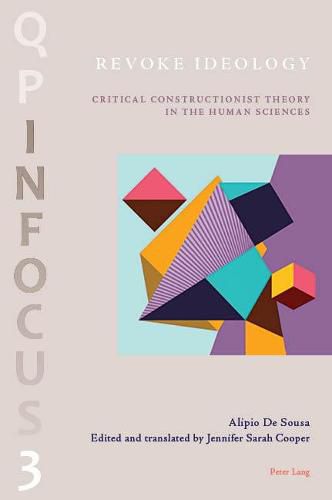Readings Newsletter
Become a Readings Member to make your shopping experience even easier.
Sign in or sign up for free!
You’re not far away from qualifying for FREE standard shipping within Australia
You’ve qualified for FREE standard shipping within Australia
The cart is loading…






This title is printed to order. This book may have been self-published. If so, we cannot guarantee the quality of the content. In the main most books will have gone through the editing process however some may not. We therefore suggest that you be aware of this before ordering this book. If in doubt check either the author or publisher’s details as we are unable to accept any returns unless they are faulty. Please contact us if you have any questions.
In these crooked times of chaotic and contradictory discourses in every social sphere, from politics to food production, ideology has become the buzzword to represent some solid structure on which to cling or under which to recoil, in an effort to understand reality. But how this structure is built and what it ultimately upholds - this is a primary focus of the Human Sciences. In this book, the author argues that in the Human Sciences, from its founders to contemporaries, a common premise is apparent: the fundamental property of all human-social reality is its character as something constructed. Through a vast set of analyses and reflections of his own, and by philosophers, psychologists, psychoanalysts, sociologists, anthropologists, neuroscientists and linguists, the author shows how this premise, applied, which he coins as critical constructionist theory, constitutes the fundamental theory of the Human Sciences. The book also traces how the main development of this theory gave rise to critical deconstructionism - philosophical, sociological, and anthropological - as an analytical procedure in contemporary studies and research, valid in discussions on culture, ethics, human rights, gender, sexuality and ethnicities. Understanding the role ideology plays in this construction, then, is key to liberation from oppressive conceptual structures of reality. This book exposes that role.
$9.00 standard shipping within Australia
FREE standard shipping within Australia for orders over $100.00
Express & International shipping calculated at checkout
This title is printed to order. This book may have been self-published. If so, we cannot guarantee the quality of the content. In the main most books will have gone through the editing process however some may not. We therefore suggest that you be aware of this before ordering this book. If in doubt check either the author or publisher’s details as we are unable to accept any returns unless they are faulty. Please contact us if you have any questions.
In these crooked times of chaotic and contradictory discourses in every social sphere, from politics to food production, ideology has become the buzzword to represent some solid structure on which to cling or under which to recoil, in an effort to understand reality. But how this structure is built and what it ultimately upholds - this is a primary focus of the Human Sciences. In this book, the author argues that in the Human Sciences, from its founders to contemporaries, a common premise is apparent: the fundamental property of all human-social reality is its character as something constructed. Through a vast set of analyses and reflections of his own, and by philosophers, psychologists, psychoanalysts, sociologists, anthropologists, neuroscientists and linguists, the author shows how this premise, applied, which he coins as critical constructionist theory, constitutes the fundamental theory of the Human Sciences. The book also traces how the main development of this theory gave rise to critical deconstructionism - philosophical, sociological, and anthropological - as an analytical procedure in contemporary studies and research, valid in discussions on culture, ethics, human rights, gender, sexuality and ethnicities. Understanding the role ideology plays in this construction, then, is key to liberation from oppressive conceptual structures of reality. This book exposes that role.